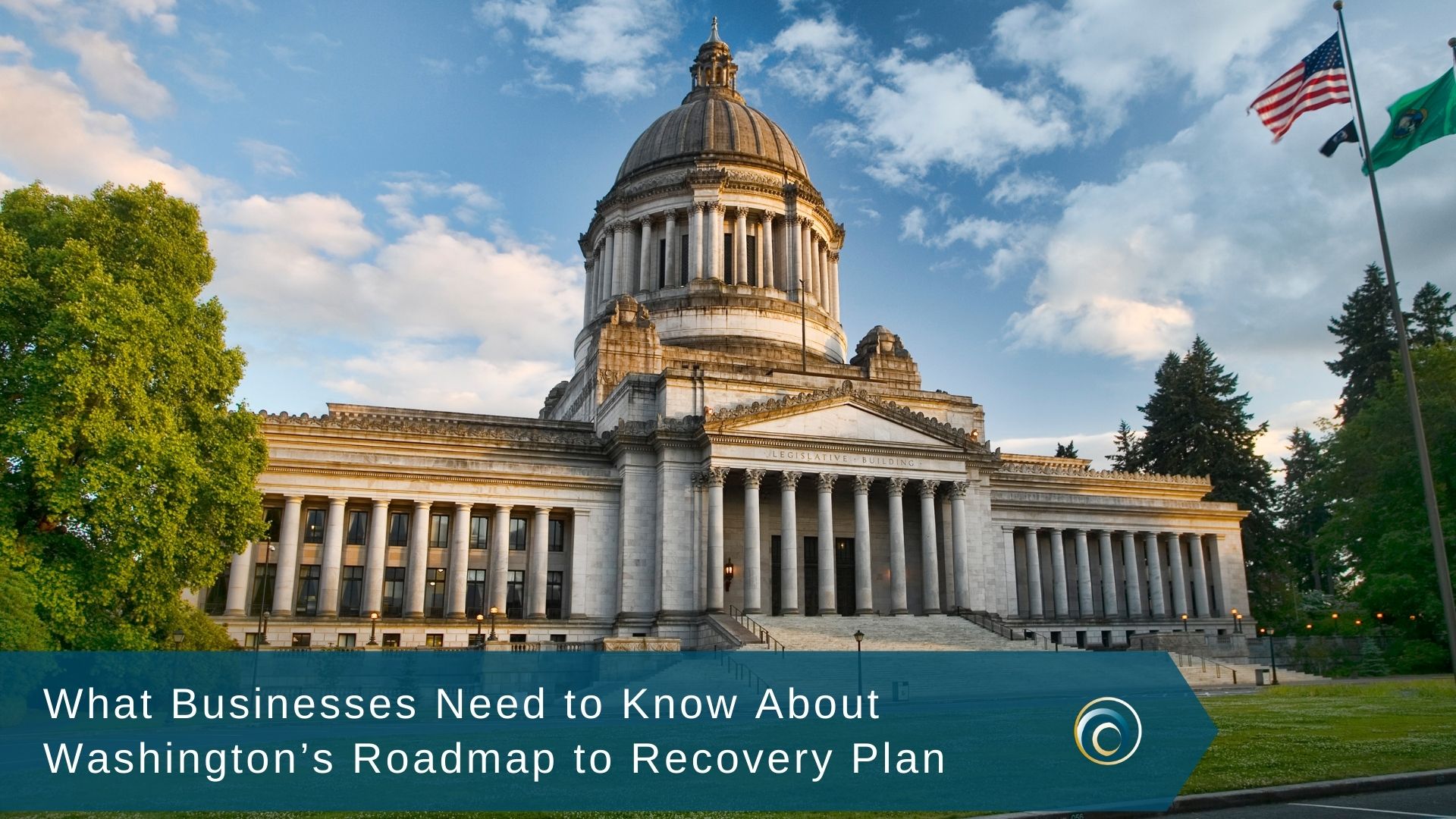
What Businesses Need to Know About Washington’s Roadmap to Recovery Plan
by Neema Nakhayee | January 11, 2021On January 5, 2021, Governor Jay Inslee announced the “Healthy Washington – Roadmap to Recovery” Covid-19 recovery plan (the “Recovery Plan”). The plan presents a phased reopening of certain businesses and activities based on key health metrics in each Washington county. The Recovery Plan will officially go into effect on January 11, 2020, and all counties will start in Phase 1.
What does the “Healthy Washington – Roadmap to Recovery Plan” entail?
The Recovery Plan provides a two-phased reopening of certain businesses. Reopening is based on health metrics determined by the Washington Department of Health (“DOH”). All counties in Washington are grouped into eight separate regions, with each region beginning in Phase 1. King, Pierce, and Snohomish counties are grouped together in the Puget Sound Region.
What do business owners need to know regarding the Recovery Plan?
Business owners should know that the Recovery Plan does not place any new restrictions on business activities. Masks and physical distancing remain mandatory statewide for all activities. Phase 1 of the Recovery Plan aligns with most of the restrictions placed on all counties back in November. Still, some businesses that shut down completely will now be permitted to open in a limited capacity. The following are a few notable activities that will have some restrictions eased in Phase 1:
- Indoor Recreation and Fitness Establishments: Appointment-based fitness and training where there is no more than one customer per room or 500 square feet for large facilities is permitted.
- Eating and Drinking Establishments: Indoor dining at eating and drinking establishments remains prohibited. Outdoor dining restrictions are eased to allow for six people per table and a limit of 2 households per table.
- Outdoor Entertainment Establishments: Outdoor entertainment establishments will be permitted to reopen in Phase 1. Establishments include zoos, outdoor theaters & concert venues, and rodeos, among other outdoor venues. Operations must be by ticketed event only with groups of 10 maximum with a limit of two households.
- Retail, Personal, Professional, and Worship Services: Remote work is encouraged, but indoor retail, personal, professional, and worship services are permitted with a maximum 25% capacity.
When will my region move into Phase 2?
To enter Phase 2, the DOH must determine that the applicable region has met a set of four metrics. These metrics look at the Covid-19 trajectory and health care system capacity. Once in Phase 2, the region must continuously meet at least 3 out of 4 metrics or risk moving back to Phase 1. A breakdown of the metrics and each region’s weekly assessment can be found here.
What happens when my region moves to Phase 2 of the Recovery Plan?
Once a region meets all four metrics and moves to Phase 2, some restrictions are further relaxed. But keep in mind that masks and physical distancing are still required statewide for all activities. The following activities will have restrictions eased in Phase 2:
- Indoor Recreation and Fitness Establishments: Indoor recreation and fitness facilities are permitted with a maximum 25% capacity.
- Eating and Drinking Establishments: Indoor dining at eating and drinking establishments is permitted with a maximum 25% capacity.
- Outdoor Entertainment Establishments: Outdoor entertaining may host groups of up to 15 with the two-household limit and an overall 75 person maximum.
- Retail, Personal, Professional, and Worship Services. No changes. Permitted with a maximum 25% capacity.
What are the consequences for businesses that do not comply with the new restrictions?
Businesses that fail to comply with the Governor’s directives may face penalties and lose their business licenses. This may depend on the level of their infraction and the extent of their noncompliance. When a complaint is filed against a business for noncompliance, the state agency with regulatory authority over the business will make initial contact to provide education on the current restrictions and requirements. If the business declines to comply with the requirements, the state agency may take further action including, but not limited to, a warning, suspension, violation, or revocation of business license.
Following the first contact or action by the state agency, if a business continues to decline to comply with the requirements, the case will be referred to local law enforcement and the business may be subject to criminal charges and/or Consumer Protection Act violation. For businesses holding liquor licenses, the Washington State Liquor and Cannabis Board (“LCB”) may potentially consider criminal citations in addition to the license sanctions. You can learn more about the potential consequences of non-compliance here.
Enlist Help
At Equinox, our team can assist you with determining measures your business needs to take to remain compliant, how to handle situations where employees are violating policy, and policy development for face coverings and other COVID-19 regulations. Contact us today at 425-250-0205 or contact@equinoxbusinesslaw.com to get started.
Legal Disclaimer: This article contains general information. Do not view this article as legal advice. Talk with counsel familiar with your unique business needs before taking or refraining from any action.